In the ever-competitive digital age, finding the best SEO tools for small business has become a pivotal task for entrepreneurs and marketers alike. This comprehensive guide delves into why SEO tools are not just about boosting visibility but are instrumental in shaping business strategies, understanding audience behavior, and driving sustainable growth. Join us as we unpack the importance of these tools and reveal how they can be the game-changers in your business’s digital journey.
Table of Contents
Why Small Businesses Need Specialized SEO Tools
In today’s digital age, SEO (Search Engine Optimization) is more than just a buzzword. For small businesses, it’s a crucial strategy to ensure they stand out in a crowded online marketplace. However, given the vastness of SEO and its continually evolving nature, the question arises: Why do small businesses need specialized SEO tools? Let’s dive in.
1. Budget Constraints
Unlike large corporations with deep pockets, small businesses often operate on limited budgets. Specialized SEO tools tailored for small businesses ensure that they get the most bang for their buck. These tools are designed keeping in mind both efficiency and affordability, ensuring that even with modest investments, small enterprises can achieve significant SEO gains.
2. Limited Manpower and Resources
Many small businesses don’t have the luxury of a dedicated SEO team. They need tools that are user-friendly and require minimal expertise. Specialized SEO tools for small businesses often come with intuitive interfaces and step-by-step guides, enabling even a novice to make informed decisions about their website’s SEO strategy.
3. Niche-specific Requirements
Small businesses often cater to specific niches or localized markets. Standard SEO tools might offer broad solutions, but specialized tools can provide insights tailored to niche markets. This ensures that small businesses can target their core audience more effectively.
4. Ease of Use for Non-experts
The world of SEO can be overwhelming, with its technical jargon and intricate algorithms. For a small business owner wearing multiple hats, diving deep into SEO nuances might be out of scope. Hence, specialized SEO tools designed for small businesses simplify complex tasks, offering actionable insights without the need for an extensive SEO background.
To sum it up, while the digital landscape offers a level playing field for businesses of all sizes, the right tools can make all the difference. With the best SEO tools for small business in their arsenal, even small enterprises can compete with industry giants, ensuring their digital visibility and success.
10 Best SEO Tools for Small Business in 2023
1. SEMrush
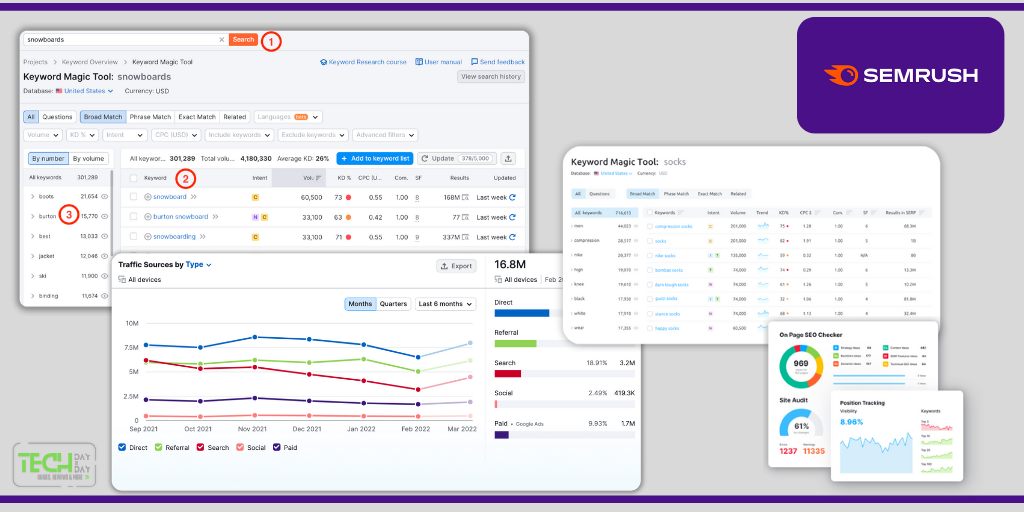
SEMrush isn’t just an SEO tool; it’s a comprehensive digital marketing suite. From content creators to ecommerce businesses, its versatility assists various digital profiles. It provides a bird’s-eye view of your site’s digital performance, pinpoints opportunities, and suggests tangible steps for improvement.
Key Features:
- Keyword analytics
- Site audit
- Traffic analytics
- Organic research,
- Backlink analysis
- Content optimization recommendations
Unique Selling Point:
Their Gap Analysis tool helps businesses identify opportunities by comparing with competitors.
Pricing:
Starts from $129.95/month.
Why It’s Great for Small Businesses:
- A one-stop-shop for most SEO needs, SEMrush simplifies complicated SEO processes, making it accessible even for beginners.
- By offering detailed competitor analysis, businesses can understand their market position.
- The intuitive interface and learning resources ensure that even non-SEOs can harness its power effectively.
2. Ahrefs

Ahrefs stands tall with its expansive index of live backlinks, making it a goldmine for off-page SEO insights. Not stopping there, Ahrefs offers a full suite of tools to explore keywords, check site health, and monitor ranks, making it more than just a backlink checker.
Key Features:
- Site explorer
- Keyword explorer
- Rank tracker
- Content explorer
- Site audit.
Unique Selling Point:
Ahrefs boasts one of the largest live backlink databases in the industry.
Pricing:
Starts from $99/month.
Why It’s Great for Small Businesses:
- With Ahrefs, small businesses can identify growth opportunities and backlink strategies that competitors use, positioning themselves effectively in the market.
- It also helps identify content gaps to outperform competition.
3. Moz Pro
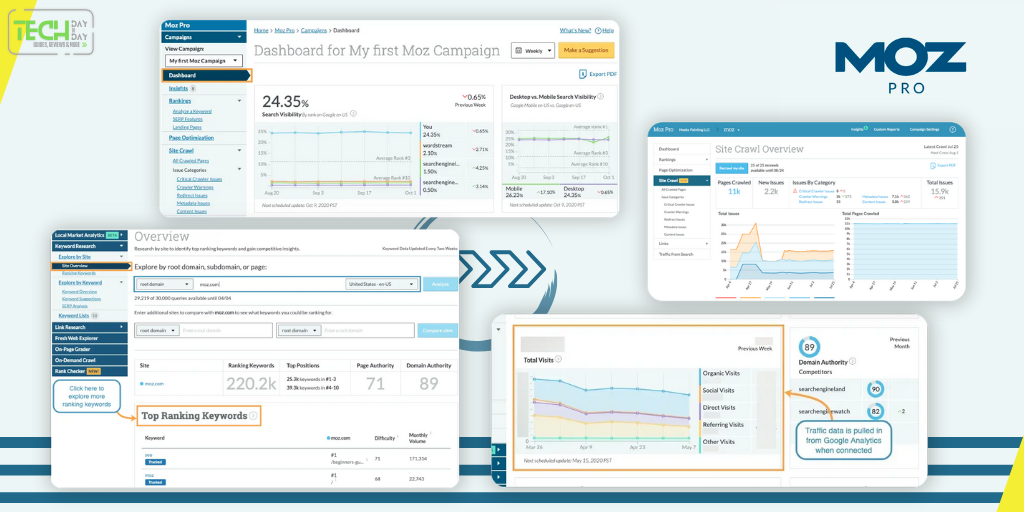
Beyond its renowned Domain Authority metric, Moz Pro offers a suite of tools that make SEO more accessible. Its commitment to data transparency and user education, reflected through Moz Academy and its community forums, is unparalleled.
Key Features:
- Keyword research
- SEO audit & crawl
- Rank tracking
- Backlink research
Unique Selling Point:
Moz’s Domain Authority (DA) score has become an industry standard for evaluating website quality and potential ranking.
Pricing:
Starts from $99/month.
Why It’s Great for Small Businesses:
- The tool offers actionable insights, simplifying complex data.
- Moz’s community and support are top-notch, providing a lot of assistance to beginners.
- With insights tailored for both beginners and pros, small businesses can grow their SEO knowledge while optimizing their online presence.
4. Ubersuggest
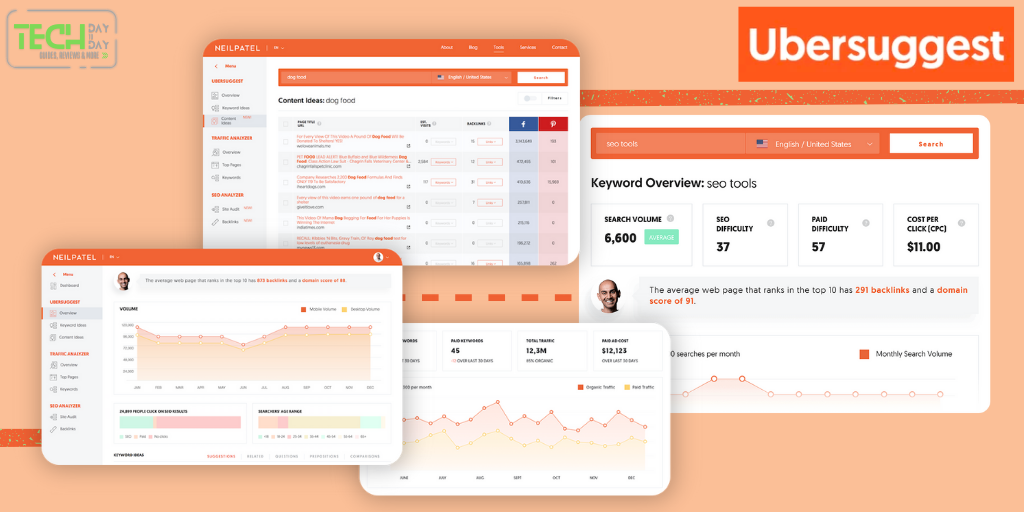
A straightforward SEO tool offering insights to optimize website traffic and rankings.Neil Patel’s Ubersuggest breaks down the barriers to SEO. What began as a simple keyword tool has evolved into a comprehensive SEO platform, revealing site issues, backlink profiles, content ideas, and more.
Key Features:
- Keyword suggestions
- Content ideas,
- Site audit
- Backlink data
Unique Selling Point:
Its free version is highly comprehensive, making it perfect for businesses on a tight budget.
Pricing:
Some features are free; premium starts from $12/month for individual (1 website).
Why It’s Great for Small Businesses:
- Beginners can start optimizing without initial investment.
- The tool also provides easy-to-understand strategies for improvement.
- Its affordability coupled with rich insights makes Ubersuggest a fantastic entry point for small businesses venturing into SEO.
5. Yoast SEO (for WordPress)
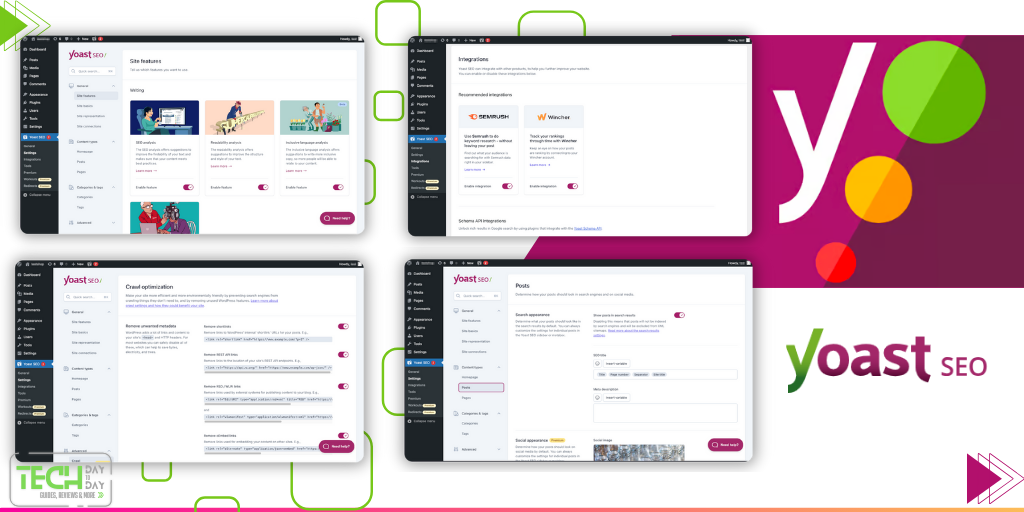
For WordPress users, Yoast SEO is synonymous with on-page optimization. But beyond guiding meta titles and descriptions, it provides readability checks, schema markup suggestions, and even internal linking recommendations.
Key Features:
Real-time page analysis, readability checks, breadcrumb navigation, XML sitemap generation.
Unique Selling Point:
Real-time content analysis helps users optimize content as they write.
Pricing:
Free version available; premium starts at $99/year for one site.
Why It’s Great for Small Businesses:
Direct integration with WordPress editor; it guides content creators for better on-page SEO, optimizing sites one post at a time eliminating the need for expertise.
6. Google Search Console
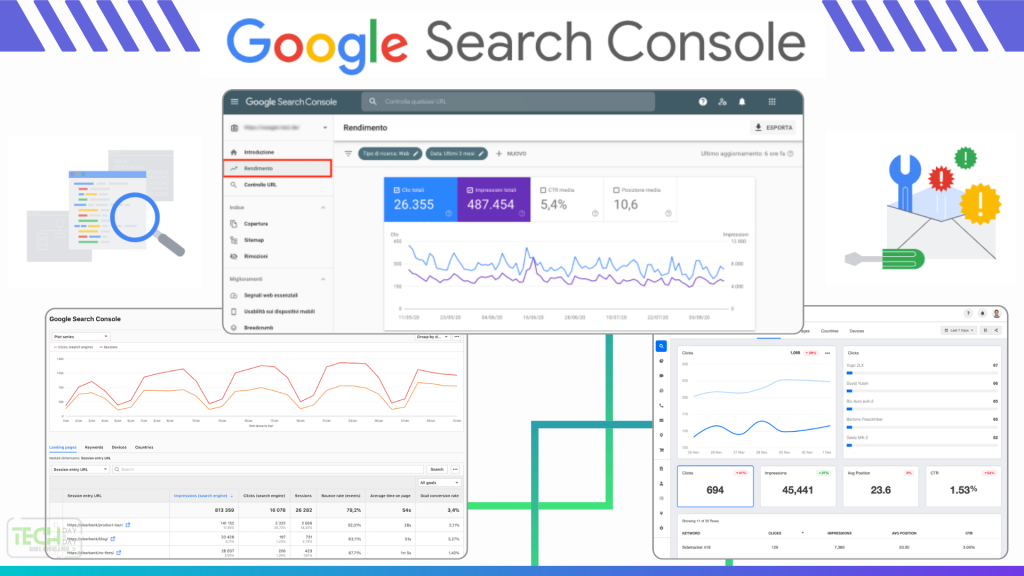
Google’s platform offering insights into how websites perform in their search results. This free tool from Google is a gateway to understanding how Googlebot views your site. From indexing status to organic performance metrics, Google Search Console is an essential tool to gauge site health and organic reach.
Key Features:
Performance reports, indexing issues, mobile usability tests, link reports.
Unique Selling Point:
Direct insights from Google about how they view your site.
Pricing:
Free
Why It’s Great for Small Businesses:
Completely free, direct feedback from the world’s leading search engine helps businesses of all sizes understand their organic performance and any issues hindering their Google ranking.
7. BuzzSumo
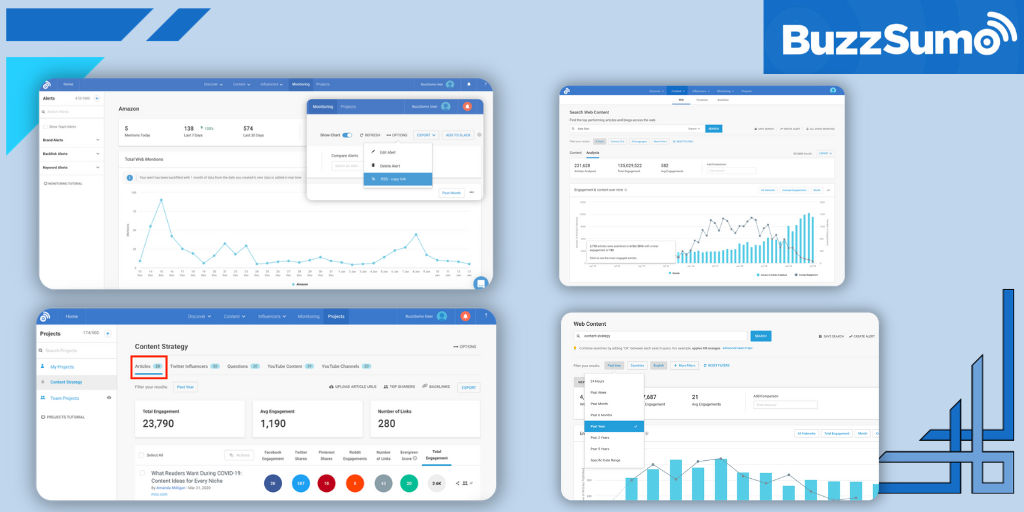
BuzzSumo is at the intersection of SEO and content marketing. By analyzing which content is resonating in your industry, it guides businesses to craft content that’s not just SEO-friendly but also share-worthy.
Key Features:
- Content insights
- Influencer identification
- Content alerts
- Competitor content analysis
Unique Selling Point:
Allows businesses to discover viral content within their niche.
Pricing:
Starts from $199/month.
Why It’s Great for Small Businesses:
- It helps in bridging the gap between content creation and content promotion, ensuring what’s produced resonates with the target audience.
8. Screaming Frog SEO Spider
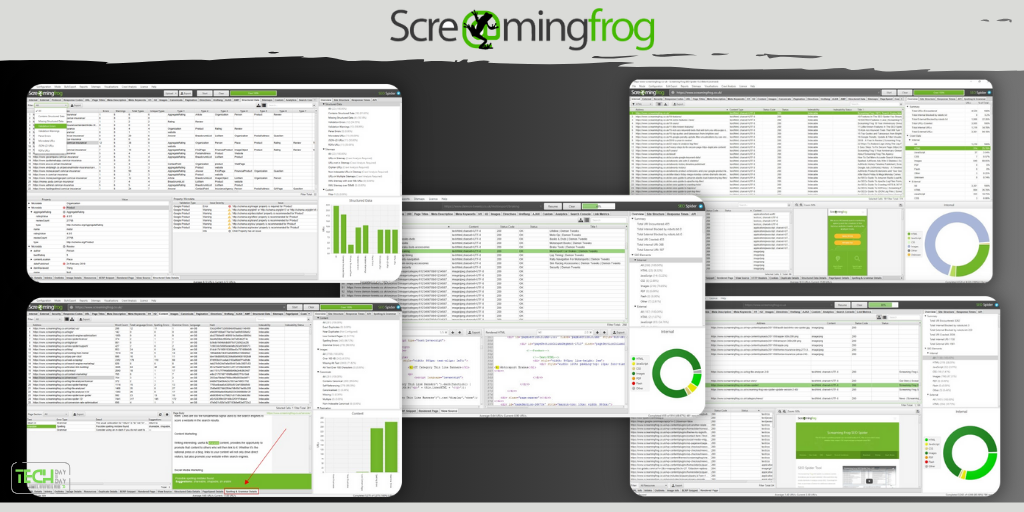
This desktop-based crawler is like a health check-up for your website. From spotting broken links to analyzing meta data and even integrating with Google Analytics, it offers a granular look at your site’s intricacies.
Key Features:
- Find broken links
- Analyze page titles & metadata
- Discover duplicate content
- Audit redirects
Unique Selling Point:
Offers a deep, granular site audit.
Pricing:
Free version available; premium at £199/year.
Why It’s Great for Small Businesses:
- The free version is suitable for small websites, making it a cost-effective solution for initial site audits.
- Its depth ensures that businesses can spot and rectify issues before they impact rankings, ensuring a healthful online presence.
9. KWFinder
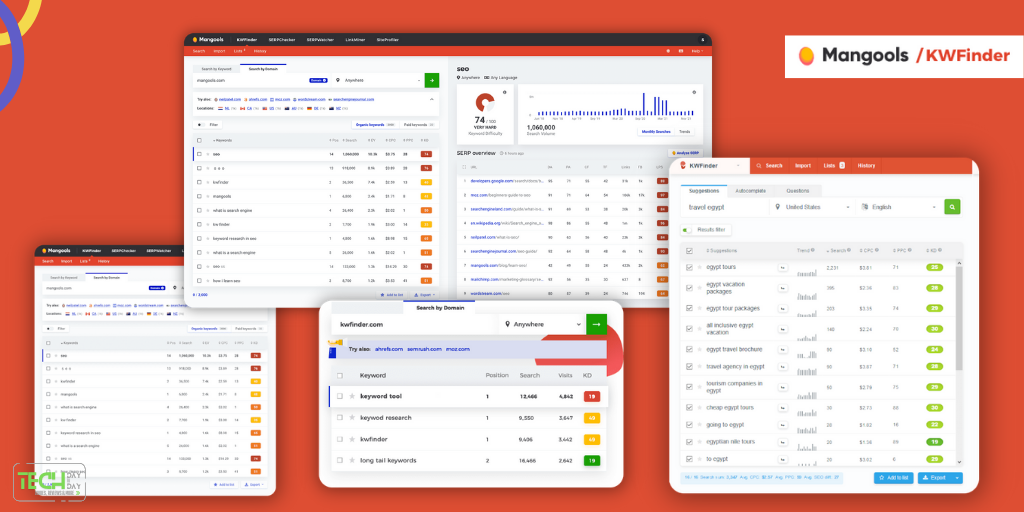
A tool designed for deep keyword research. KWFinder’s emphasis on long-tail, low-competition keywords offers a strategic advantage in the crowded online space. With its visually appealing interface, it makes keyword research a breeze, offering insights into search trends, volumes, and competitiveness.
Key Features:
- Keyword difficulty score
- Search volume data
- Related keywords
Unique Selling Point:
Focus on long-tail keywords with lower competition.
Pricing:
Starts from $29.00/month. (Currently there is an offer price starting from $19.90/month)
Why It’s Great for Small Businesses:
- It offers a roadmap to online visibility, guiding businesses to rank for terms that drive traffic yet are achievable.
10. AnswerThePublic

Tapping into the real-time curiosities of the masses, AnswerThePublic transforms simple keywords into a spectrum of questions, prepositions, and related searches. It’s less of a tool and more of a content ideation companion.
Key Features:
- Visual keyword research maps
- Data aggregations from search engines.
Unique Selling Point:
Gathers user-generated content questions for specific keywords.
Pricing:
Free version available; Pro starts at $49/month
Why It’s Great for Small Businesses:
- In a digital age where answering user intent is paramount, this tool provides the queries to target, aligning content strategy with user needs.
Features to Consider When Selecting an SEO Tool for Small Business
Selecting the right SEO tool for your small business is crucial. The best SEO tools for small business are those that strike a balance between comprehensive features and user-friendliness. But with numerous options available, how do you decide? Here are essential features to consider:
1. User Interface (UI) and Experience (UX)
- A tool can be packed with features, but if it’s complicated, you might end up under-utilizing it. An intuitive UI/UX ensures you make the most of the tool without a steep learning curve.
- Small businesses often don’t have dedicated SEO experts. A friendly interface ensures that even beginners can navigate and derive insights.
2. Keyword Research Capabilities
- Keywords are the backbone of SEO. An effective tool should offer keyword suggestions, search volume data, and competitive analysis.
- Identifying the right keywords can position a small business to compete effectively, even against larger competitors.
3. Backlink Analysis
- Understanding who links to you and, more importantly, how you compare to your competition is essential.
- Backlinks can significantly impact domain authority and ranking.
- Knowing where to acquire quality links can make a difference.
4. On-page SEO Analysis
- This involves reviewing page elements like meta tags, content quality, and URL structure.
- Small tweaks can lead to ranking improvements.
- Identifying gaps in on-page elements can guide content updates.
5. Reporting and Analytics
- The ability to track and report on key metrics like organic traffic, keyword rankings, and site health is paramount.
- Regular reports allow for adaptive strategies. If something’s working, you do more of it. If not, you pivot.
6. Integration Capabilities
- A tool that integrates with other platforms, like Google Analytics or CMS platforms, can provide a holistic view.
- Integration saves time by centralizing data, streamlining analysis and strategy formulation.
The best SEO tools for small business are those that match the business’s needs, skill levels, and budget. By considering the features above, small businesses can find a tool that not only boosts their visibility but also fosters growth in the digital landscape.
Common Mistakes to Avoid When Using SEO Tools
Even the best SEO tools for small business can’t guarantee success if not used correctly. As you embark on your SEO journey, it’s just as essential to know what not to do as it is to understand the best practices. Let’s uncover some common pitfalls:
1. Over-reliance on Automated Insights
- While automation and suggestions from tools can be beneficial, they shouldn’t replace human intuition and understanding of your unique business context.
- SEO tools offer generic advice. What works for one site might not work for another. Always cross-check and contextualize the suggestions.
2. Ignoring Baseline Metrics
- Before diving deep into optimization, it’s crucial to understand where you currently stand.
- Without a baseline, it’s challenging to measure progress or the effectiveness of your SEO strategies.
3. Chasing Every Keyword
- Just because a keyword has high search volume doesn’t mean it’s right for your business.
- Not all traffic is valuable. It’s better to target keywords that resonate with your business and audience, ensuring a higher conversion rate.
4. Neglecting Mobile Optimization Insights
- A significant portion of web users browse on mobile. Ignoring mobile optimization can be detrimental.
- A poor mobile experience can lead to lost traffic and lower rankings, especially after Google’s mobile-first indexing.
5. Not Regularly Reviewing Reports
- Periodic reviews of SEO metrics and results are crucial to adapting and refining strategies.
- Without regular checks, you might miss out on emerging issues or opportunities.
While the best SEO tools for small business provide a robust framework to enhance online visibility, it’s the strategic and informed use of these tools that brings true success. By being aware of these common missteps, you’re already a step ahead in ensuring that your SEO efforts yield tangible results.
FAQs About the Best SEO Tools for Small Business
Navigating the realm of SEO can raise many questions, especially for small businesses looking to make their mark. To aid in your journey, we’ve compiled answers to some frequently asked questions regarding the best SEO tools for small business.
1. Are Free SEO Tools Worth It?
- Answer: While free SEO tools can provide valuable insights, especially for beginners, they often lack the comprehensive features of paid versions. For a small business on a tight budget, they can be a good starting point, but as your business grows, investing in a paid tool is advisable for deeper analysis.
2. How Often Should I Check My SEO Metrics?
- Answer: Regular monitoring is essential. At a minimum, monthly checks are advisable. However, if you’re running specific campaigns or have made significant changes to your website, more frequent checks (e.g., weekly) might be beneficial.
3. Do All Businesses Need Advanced SEO Tools?
- Answer: The complexity of the tool required often correlates with the complexity of the business and its digital presence. A local bakery might not need as intricate a tool as an e-commerce site shipping globally.
4. Can SEO Tools Guarantee Top Rankings on Search Engines?
- Answer: No tool can guarantee top rankings. What they can provide are insights, data, and recommendations to optimize your website. Actual rankings depend on various factors, including competition, content quality, and search engine algorithms.
5. How Do I Know If My SEO Tool Is Delivering Results?
- Answer: Regularly measure the ROI by checking metrics like organic traffic, keyword rankings, and conversion rates. If these metrics show positive trends and align with your business goals, your tool is likely effective.
Choosing the best SEO tools for small business can be overwhelming, but arming yourself with knowledge makes the process smoother. Remember, the tool is as effective as its user. Continual learning and adaptation are keys to SEO success.
Key Takeaways: The Role of SEO Tools in Small Business Growth
Understanding the Digital Landscape:
SEO tools provide invaluable insights into the digital ecosystem. By analyzing search trends, competitive landscapes, and user behaviors, they offer a clearer picture of where a business stands.
Targeted Strategies:
Armed with data from SEO tools, small businesses can craft targeted marketing strategies. This ensures they reach their desired audience effectively, maximizing ROI.
Continuous Optimization:
SEO isn’t static; it’s a continuous process. With the help of tools, businesses can regularly tweak and refine their online strategies, ensuring they always stay ahead of the curve.
Resource Efficiency:
For many small businesses, resources are limited. SEO tools streamline various tasks like keyword research, backlink analysis, and site audits, saving time and effort.
Driving Sustainable Growth:
Ultimately, the primary goal is growth. With the right SEO tools, small businesses can drive increased traffic, improve conversions, and ensure sustainable growth in the digital realm.
In essence, SEO tools aren’t just about improving search rankings; they play a pivotal role in shaping the growth trajectory of small businesses in the digital age.
Final Thoughts
In wrapping up our deep dive into the best SEO tools for small business, it’s clear that these tools are not just luxuries but essential components for modern business success. As the digital landscape constantly evolves, so must our strategies and approaches. With the right SEO tools in hand, small businesses are not just improving their visibility; they’re gleaning valuable insights that can shape their future direction and growth. Investing in SEO is more than just chasing rankings; it’s about understanding and connecting with your audience, staying ahead of competitors, and ensuring sustained growth in the ever-competitive online marketplace.



